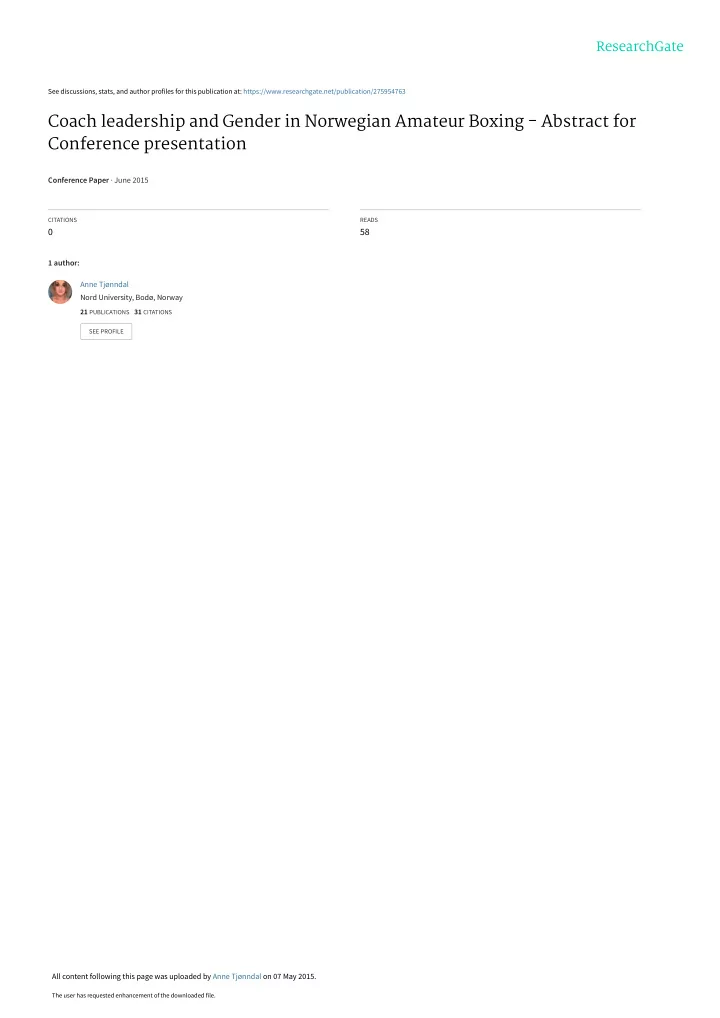

See discussions, stats, and author profiles for this publication at: https://www.researchgate.net/publication/275954763 Coach leadership and Gender in Norwegian Amateur Boxing - Abstract for Conference presentation Conference Paper · June 2015 CITATIONS READS 0 58 1 author: Anne Tjønndal Nord University, Bodø, Norway 21 PUBLICATIONS 31 CITATIONS SEE PROFILE All content following this page was uploaded by Anne Tjønndal on 07 May 2015. The user has requested enhancement of the downloaded file.
Coach leadership and Gender in Norwegian Amateur Boxing Tjønndal, A. NTNU (Trondheim, Norway). Introduction Coach leadership is a substantial factor in developing talent, sport expertise and motivational climate among athletes (Riemer, 2007; Young & Medic, 2008). Worldwide, coaching is a male preserve and female coaches are a rare exception in elite sport. Gender has been shown to affect coach leadership (Pfister, 2013). Therefore, the purpose of this study was to examine styles and forms of coach leadership and how these are influenced by constructs of gender. Methods A national sample of 59 boxing coaches (53 male, 6 female) from Norway participated in this study. The methods of investigation were an online quantitative survey using the Leadership Scale for Sports (Chelladurai & Saleh, 1980) and qualitative interviews focusing on leadership and meanings of gender. 8 coaches (5 male, 3 female) were chosen for interviews. Results The most frequent self-reported dimensions of leadership behaviour among the coaches were positive feedback (M=4.36, SD=.41), training and instruction (M=3.85, SD=.45) and democratic behaviour (M=3.32, SD=.59). No significant gender differences in coach leadership among Norwegian boxing coaches were found in the survey data (p=0.05). The qualitative results indicated that male coaches perceived themselves as more autocratic, while female coaches emphasised a democratic leadership style. Female coaches were seen as exceptional and often associated with traditional female roles such as caretakers. The male dominated culture affected the way good leadership was defined and assessed. A consequence of this was that women's approaches to leadership were not included in the definition of good leadership. Discussion Boxing is a male dominated sport. This is likely to affect leadership and meanings of gender among coaches and athletes. My research is limited to how coaches experience leadership and gender. How this affects the coach-athlete relationship, athlete motivation and development would be relevant topics for further research.
References Chelladurai, P. & Saleh, S.D. (1980). Dimensions of leader behavior in sports: development of a leadership scale. Journal of Sport Psychology, 2 , 34 – 45. Pfister, G. (2013). Outsiders: Female Coaches Intruding Upon a Male Domain? in G.Pfister & M.K.Sisjord (eds.) Gender and Sport – Changes and Challenges (71 – 103). Germany: Waxmann. Riemer, H.A. (2007). Multidimensional Model of Coach Leadership. i S. Jowett & D. Lavallee (eds). Social Psychology in Sport (57 – 75). Champaign, United States: Human Kinetics. Young, B.W. & Medic, N. (2008). The motivation to become an expert athlete: how coaches can promote long-term commitment. In D.Farrow, J. Baker & C. MacMahon (eds.). Developing sport expertise – Researchers and coaches put theory into practice (pp.43-60). Oxon: Routledge. Contact anne.tjonndal@ntnu.no View publication stats View publication stats
Recommend
More recommend